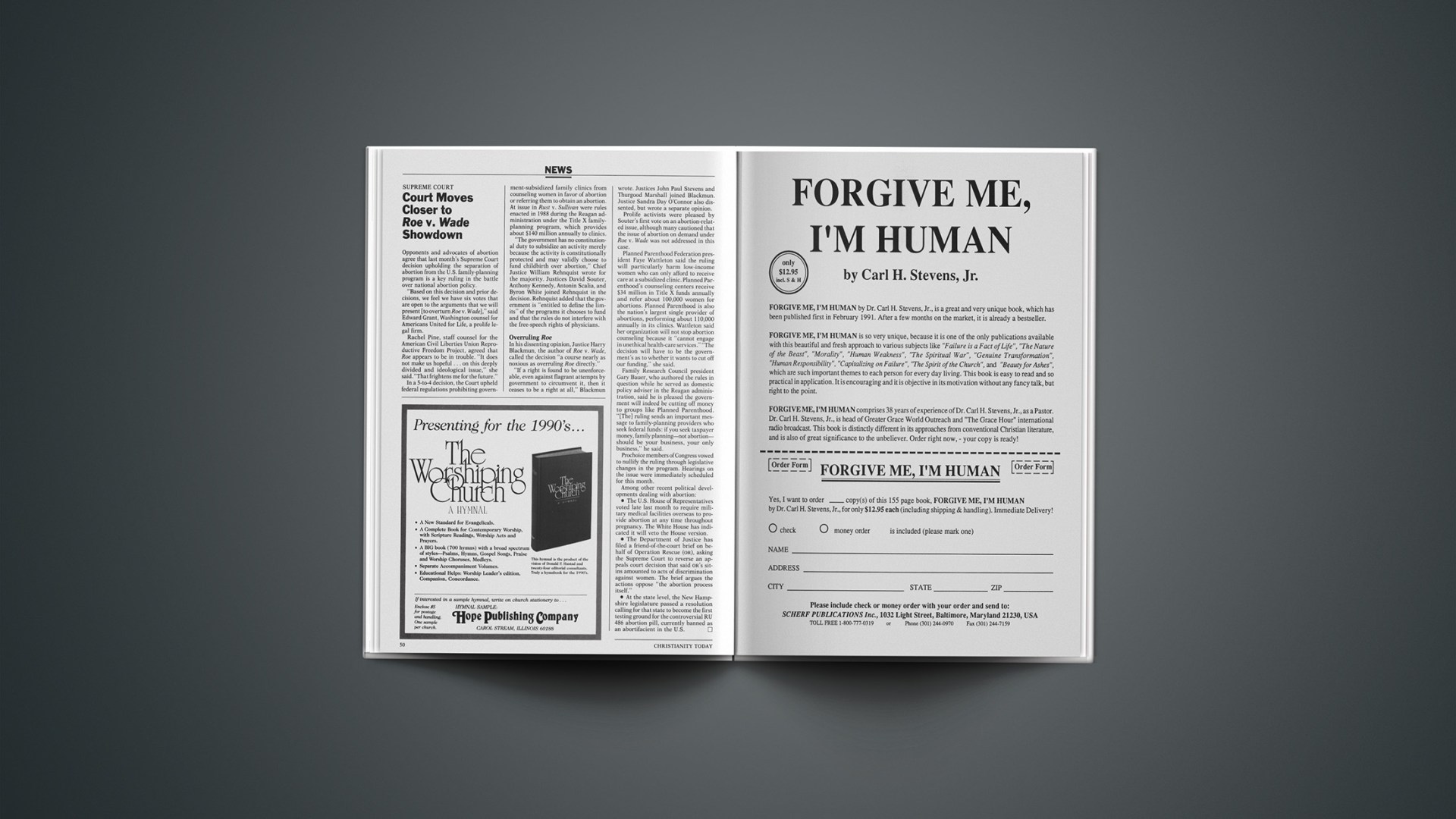Opponents and advocates of abortion agree that last month’s Supreme Court decision upholding the separation of abortion from the U.S. family-planning program is a key ruling in the battle over national abortion policy.
“Based on this decision and prior decisions, we feel we have six votes that are open to the arguments that we will present [to overturn Roe v. Wade], “said Edward Grant, Washington counsel for Americans United for Life, a prolife legal firm.
Rachel Pine, staff counsel for the American Civil Liberties Union Reproductive Freedom Project, agreed that Roe appears to be in trouble. “It does not make us hopeful … on this deeply divided and ideological issue,” she said. “That frightens me for the future.”
In a 5-to-4 decision, the Court upheld federal regulations prohibiting government-subsidized family clinics from counseling women in favor of abortion or referring them to obtain an abortion. At issue in Rust v. Sullivan were rules enacted in 1988 during the Reagan administration under the Title X family-planning program, which provides about $140 million annually to clinics.
“The government has no constitutional duty to subsidize an activity merely because the activity is constitutionally protected and may validly choose to fund childbirth over abortion,” Chief Justice William Rehnquist wrote for the majority. Justices David Souter, Anthony Kennedy, Antonin Scalia, and Byron White joined Rehnquist in the decision. Rehnquist added that the government is “entitled to define the limits” of the programs it chooses to fund and that the rules do not interfere with the free-speech rights of physicians.
Overruling Roe
In his dissenting opinion, Justice Harry Blackmun, the author of Roe v. Wade, called the decision “a course nearly as noxious as overruling Roe directly.”
“If a right is found to be unenforceable, even against flagrant attempts by government to circumvent it, then it ceases to be a right at all,” Blackmun wrote. Justices John Paul Stevens and Thurgood Marshall joined Blackmun. Justice Sandra Day O’Connor also dissented, but wrote a separate opinion.
Prolife activists were pleased by Souter’s first vote on an abortion-related issue, although many cautioned that the issue of abortion on demand under Roe v. Wade was not addressed in this case.
Planned Parenthood Federation president Faye Wattleton said the ruling will particularly harm low-income women who can only afford to receive care at a subsidized clinic. Planned Parenthood’s counseling centers receive $34 million in Title X funds annually and refer about 100,000 women for abortions. Planned Parenthood is also the nation’s largest single provider of abortions, performing about 110,000 annually in its clinics. Wattleton said her organization will not stop abortion counseling because it “cannot engage in unethical health-care services.” “The decision will have to be the government’s as to whether it wants to cut off our funding,” she said.
Family Research Council president Gary Bauer, who authored the rules in question while he served as domestic policy adviser in the Reagan administration, said he is pleased the government will indeed be cutting off money to groups like Planned Parenthood. “[The] ruling sends an important message to family-planning providers who seek federal funds: if you seek taxpayer money, family planning—not abortion—should be your business, your only business,” he said.
Prochoice members of Congress vowed to nullify the ruling through legislative changes in the program. Hearings on the issue were immediately scheduled for this month.
Among other recent political developments dealing with abortion:
• The U.S. House of Representatives voted late last month to require military medical facilities overseas to provide abortion at any time throughout pregnancy. The White House has indicated it will veto the House version.
• The Department of Justice has filed a friend-of-the-court brief on behalf of Operation Rescue (OR), asking the Supreme Court to reverse an appeals court decision that said OR’s sit-ins amounted to acts of discrimination against women. The brief argues the actions oppose “the abortion process itself.”
• At the state level, the New Hampshire legislature passed a resolution calling for that state to become the first testing ground for the controversial RU 486 abortion pill, currently banned as an abortifacient in the U.S.










